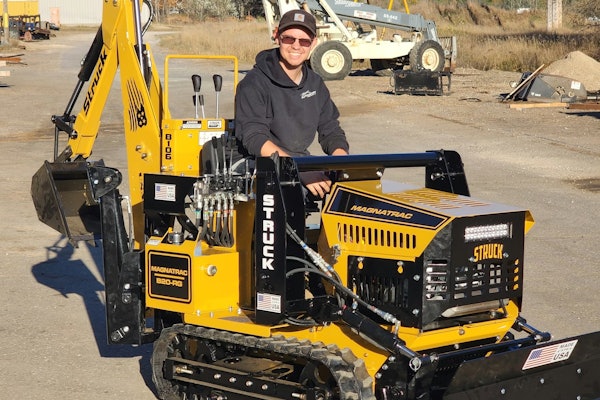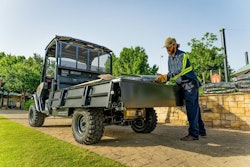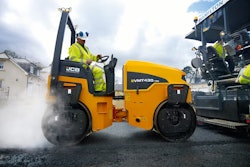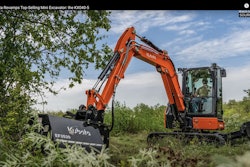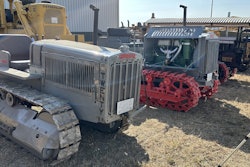Mark Rose’s farm background gives a natural connection to his business, which he started in 1989 at the age of 23. He relishes the growth his firm has seen – the company realized $8.5 million in sales last year. “We’re maintaining about a 20-percent growth margin per year, and it’s all because of our employees,” Rose says. “Our people are just excellent – they’ll work seven days a week if they have to.”
Beginning in the residential market, Rose quickly expanded to the commercial market. “We had some good breaks,” he says, attributing a lot of his growth to Jeff Reynolds, president of nearby pipeline contractor Reynolds, Orleans, Indiana. “I’ve worked with him longer than anyone, and he’s really helped us out along the way,” Rose comments. “He gave us a lot of good advice, especially on equipment.” Rose works behind Reynolds crews, doing site work and clean up after pipeline and after treatment plant jobs.
Today, 80 percent of his work is erosion control, which also includes his seeding and sodding activities, and 20 percent is landscaping. His work requires flexibility. “Weather controls so much of it,” he says. “It doesn’t matter if it rained all week, you’ve got to get the job done. And we don’t worry about who’s supposed to do what on a job. If something needs to be cleaned up before my guys can work, then they’ll do it. Our main objective is to get the job done and get everybody out of there.”
Past commercial landscape jobs have included the Bass Pro Shop in Clarksville, Indiana, which involved an unusual request: cut down 25-inch-diameter, 70-foot-tall trees, take off their branches, and then carefully reassemble them inside the building. “They had to number the pieces so they could put them back together,” Rose says.
Rose doesn’t limit himself to Indiana. He works in 13 different states on jobs that include seeding and sodding work on military bases and airports. In 2005, the firm completed a $4.5 million seeding job at the Cincinnati-Northern Kentucky airport, and recently finished a $2 million seed package at the Honda plant in Greensburg, Indiana. Rose Sodding & Seeding is also pre-qualified in four states for highway-related work.
Grow your own
Rose has a grow-your-own philosophy. “We grow about 300 acres of sod,” he says, which is harvested every 13 months. They also harvest about 130,000 bales of straw a year, all of which they use in-house. Only 10 percent of the sod is sold outside the firm.
This do-it-yourself outlook does not extend to aspects of the business that Rose knows are not in his expertise. “I’ll hire someone to do it,” he says, citing as one example his controller Margaret Hunt. “She takes care of our payroll and accounting,” he says. “I don’t want to be an expert in those areas, but I know enough to surround myself with people that are the top in their field.”
And so with the office work left in capable hands, Rose will spend his time going to jobsites. He doesn’t want to overrule the foremen, but just offer his presence if anyone has an issue. This can only be accomplished on nearby jobs, however. If there’s a job in Colorado, for instance, the foreman has the full authority to buy or rent material and equipment. “We’ve got that kind of trust,” he says.
One benefit employees especially seem to enjoy is a two-week paid holiday at the end of the year. “I like for everyone to be with their families over the holidays, so we shut down,” Rose explains. “And it doesn’t go against their vacation or personal days.”
Rose appreciates young crews, estimating the average age of his employees is around 27. “I look at people as investments and I like to hire someone I think I might have for 20 to 25 years,” he says.
These younger employees include his son, Mark Matthew Rose, 21, and did include his daughter Jessica Baxter, 26, who now works at Mid-America Erosion Control Blanket, a Rose Seeding & Sodding spin-off.
Make your own
Rose formed the Mid-America firm as a result of the frustration he experienced in trying to get timely receipt of popular erosion control blankets. “They were a real hassle to get,” he says, “because so many companies were making them.” So he decided to form a separate company and make his own.
“Mark’s never been scared of taking risks,” says Greg Huber, Huber’s Orchard, Starlight, Indiana. “He’s not afraid to tackle anything in his line of business.”
The company required a $1 million investment, and this was just to supply himself at first. The blanket-making machine came from Germany, so it entailed a detailed inspection, delivery and setup. Outside sales eventually increased to the point that Rose’s firm was buying only 25 percent of total production. This meant product deliveries, which prompted him to form a trucking company, Rose Equipment Transport.
“It took off like a rocket,” he says of Mid-America, going from $100,000 in sales the first year to more than $1 million the second. When he sold the firm to his nephew Matt Roberts in 2005, sales were at the $3 million mark. He had a stipulation with the sale, however: Rose Sodding & Seeding would still get immediate delivery of the blankets at a competitive price.
Neat freak
Rose believes in keeping his 128-piece equipment fleet updated. “When you see his equipment going down the road, it’s like it’s a brand new delivery to a dealership,” says Jay Jacobi with Jacobi Sales in Sellersburg, Indiana. “Mark thinks the image his equipment presents is a big key to his success,” says Dave Heck with Whayne-The Cat Rental Store. “He’s almost a neat freak,” adds Jeff Reynolds. “His yard is immaculate.”
A second-shift crew handles all equipment maintenance on a fleet that includes skid steers, toolcarriers, tractors and compact rubber-track loaders. “We really worry about keeping things clean,” Rose says. Another plus: regularly cleaning the equipment offers the chance to catch maintenance situations before they become problems.
“You don’t want your guys out there all day working on equipment instead of the job,” Rose says. “We do it all, replace motors and everything. But now since we’re buying new equipment, most of it’s under warranty so we don’t do as much as we used to.”
He didn’t always have this buy-new philosophy. As do most contractors starting out, he bought used equipment, but then says he ended up spending too much time and money on repairs. “It didn’t take long to figure out we could be buying new equipment cheaper than buying those parts,” he comments.
Rose likes to research equipment that he thinks will give him an upper hand. “One machine that’s helped us a great deal is our compact rubber-track loader,” he says. “Rain would shut us down quick with the rubber-tired loaders, but with these machines we can get on the ground when it’s wet and work it. It has helped us keep busier longer in the season.”
In fact, when Rose’s compact track loaders worked on one of its airport jobs, they caught the eye of UPS. The result: UPS rented eight Rose loaders during the winter for snow removal around the terminal area. Rose does their own share of renting, usually compact excavators, articulated loaders, light towers and generators.
Rose looks at ownership this way: if he needs seven compact rubber-track loaders in his fleet, he’ll own eight. “That way, if one’s in the shop, we’ve always got one more than we need,” he says.
But good equipment only goes so far, Rose contends. “If you have a half million dollar machine, you’ve got to recognize that the employee who runs that machine should get the top money in the market,” he states.
Follow the good contractors
Rose insists on teamwork with his general contractors. “There are a lot of contractors that will bid jobs just to get them and then they try to make their money off their subs,” he says. “I don’t agree with that. When we sub out work ourselves, we don’t try to beat anybody up. You’ve got to take care of the people that take care of you or they’re not going to be there anymore.”
He’s picky about who he’ll work for, primarily because he follows a number of his general contractors around the country. “I’ll grow as the good contractors we work with grow,” he says, “and as long as we can find the people to manage it.”
There are limits even with his present size. “If one guy thinks he can sit there and manage a company this size by himself, he’s really fooling himself,” Rose contends.
But even with his company positioned as it is, Rose appreciates his roots. Farming is still one of his passions. At times he’ll turn the cell phone off and operate a tractor on one of the pieces of land he owns. “What we do is so closely related with farming, and I guess that’s why it clicks so well with me. If it’s not raining outside, I’m working. I just really enjoy what we do.”


